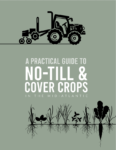The educational materials listed on this page are about No-Till.
No-till farming is a conservation tillage technique where all of a previous crop's residue is left on the soil surface after harvest. No-till systems are usually managed using specific tools—a conservation planter for row crops or a no-till drill for more narrowly seeded crops. Crop residue on the soil surface helps improve soil health by providing protection against soil erosion, temperature extremes and water evaporation, and adding soil organic matter. If converting to no-till from a traditional tillage system, producers may start with a less drastic change such as strip-, ridge- or zone-till to help increase the soil’s organic matter. No-till farmers have to be more aware of weed control, compaction prevention and seed placement than conventional farmers. Cover crops are often turned under in conventional tillage systems, but adding cover crops to a no-till system improves soil health, provides nutrients and increases soil moisture. Using no-till in organic systems is not as common because residue on the soil surface increases weed pressure. Organic producers can use a roller crimper to flatten cover crops, which creates a mulch that will help suppress weeds. Learn about the impact that tillage has on your soils and various soil conservation options in the Reducing Tillage chapter of Building Soils for Better Crops.
Showing 1-2 of 2 results
How Alive is My Soil?
This guide presents soil testing methods that can be performed in the field by farmers, gardeners, or anyone who desires to understand and appreciate soil from a different perspective. While these tests aren’t intended to be a replacement for sending soil to a lab, they can be considered complementary to annual or biannual lab analysis.

A Practical Guide to No-Till and Cover Crops in the Mid-Atlantic
No-till and cover crops are among the most cost effective tools to reverse soil and carbon loss and improve soil health; the economic, agronomic and environmental benefits of these practices are well known within the farming community. Transitioning from conventional farming to no-till, and incorporating the use of cover crops, requires a higher level of […]